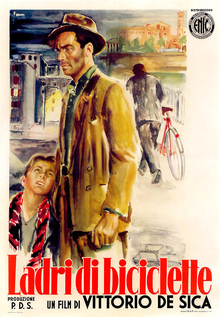 For American audiences, cinema in the wake of World War II was a pleasant and occasionally colorful affair, characterized by sentimental favorites like It's a Wonderful Life and Singing in the Rain. Cinema in Italy was another sort of affair entirely -- in sharp contrast to the optimism of contemporaneous American movies (as well as the telefono biancho pictures that dominated the cinema of Mussolini's Italy a decade earlier), the tone of Italian movies in the latter half of the 1940s was often times downright depressing. The most iconic film of the Neorealist era (as the style became known) is perhaps Vittorio De Sica's The Bicycle Thief (Ladri di Biciclette).
For American audiences, cinema in the wake of World War II was a pleasant and occasionally colorful affair, characterized by sentimental favorites like It's a Wonderful Life and Singing in the Rain. Cinema in Italy was another sort of affair entirely -- in sharp contrast to the optimism of contemporaneous American movies (as well as the telefono biancho pictures that dominated the cinema of Mussolini's Italy a decade earlier), the tone of Italian movies in the latter half of the 1940s was often times downright depressing. The most iconic film of the Neorealist era (as the style became known) is perhaps Vittorio De Sica's The Bicycle Thief (Ladri di Biciclette).The film follows an episode in the life of Antonio Ricci. Antonio manages to secure a much-coveted job, but will need a bicycle if he wishes to work. He and his wife Maria pawn off their bed sheets in order to buy a bicycle. Antonio's job, as it turns out, is hang posters around town (as though to highlight the difference between the United States and Italy, the posters he hangs are promotional portraits of a glamorous Rita Hayworth). It is while hanging one such poster that Antonio's bike is stolen. With the help of a few friends and his faithful son Bruno, Antonio spends the rest of the film trying to find his stolen bicycle. I won't give away too many details, but I will tell you that all does not end well.
The search for the bicycle is hardly the only point of interest, however: the film also presents an absorbing portrait of an extremely sympathetic father and son duo. Antonio and his son Bruno play off one another quite well, and that they are able to stick together through their hardship is one of the few uplifting aspects of the story.
No less interesting is the struggle between Antonio's sense of decency and his growing desperation. He is not out to beg, borrow or -- as it were -- steal; he wants only to earn an honest living for his family. Yet as time and money begin to run dry Antonio becomes increasingly exasperated, a condition which leads him in the final scenes of the film to transgress his moral standards with almost disastrous consequences. Although he manages to avoid complete tragedy, the end of the film finds Antonio and Bruno utterly dispirited, their future anything but certain.
The ending is more than a little anticlimactic, and rather depressing to boot. Even so, the film is positively engrossing. It does a remarkable job of drawing the viewer into its world, and the everyman quality of its protagonists make them very easy to identify with. Indeed, this everyman quality is magnified by the fact that the cast is composed almost entirely of non-professional actors (Lamberto Maggiorani, who plays Antonio, was actually a factory worker prior to appearing in this film). Yet in spite of that fact, we see some very naturalistic performances; even young Enzo Staiola does a hell of a job as Bruno. TCM counts The Bicycle Thief as among the fifteen most influential films of all time, a difficult claim to dispute. This is strongly recommended viewing for film buffs, especially those interested in foreign films.
No comments:
Post a Comment